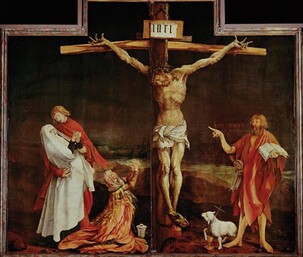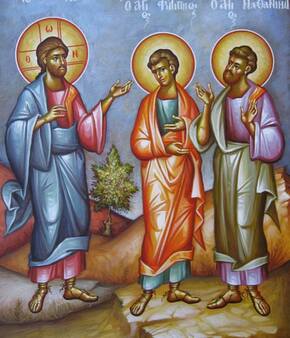 Giovanni di Paolo, “St. John the Baptist in Prison Visited by Two Disciples,” ca. 1455-1460 (photo: Public Domain)
Giovanni di Paolo, “St. John the Baptist in Prison Visited by Two Disciples,” ca. 1455-1460 (photo: Public Domain)
 Giovanni di Paolo, “St. John the Baptist in Prison Visited by Two Disciples,” ca. 1455-1460 (photo: Public Domain) Giovanni di Paolo, “St. John the Baptist in Prison Visited by Two Disciples,” ca. 1455-1460 (photo: Public Domain) Try as I might, I have always found John the Baptist to be an off-putting, and certainly a disturbing, figure in the Christian story. And I have tried. For I was ordained deacon in St John at Hackney, a church named after John the Baptist, and I served in the community there. Each year, we would have our patronal festival, and try to find ways to see how the Baptist could relate to our usual church life. To be honest, it was easier than in the past. For St John at Hackney was originally a very high society church – indeed, the focal borough church in Hackney - and its impressive churchyard still contains many notable figures, such as the Baden Powell family, from whom the worldwide scouting movement issued. By the 1980s however, Hackney was both London’s poorest and most multicultural borough, and our congregation was very different; all part of the Anglican Church’s journey in the inner cities from being the church of ‘the great and the good’ to being one of the ‘marginal and the odd’. Over half of our congregation also drew their origins from West Africa or the West Indies. Well, maybe John the Baptist might have felt somewhat at home, being on the prophetic margins of his society. Yet his appearance and demeanour would still have marked him out. Indeed, even some of the more radical and vibrant of our congregation would have struggled with some of his language of repentance and its tone. Similarly, I suspect that we would not be wholly comfortable with him here. For John the Baptist was most certainly a ‘disturber of the peace’ in very uncomfortable ways. Indeed, the story of his violent death we heard this morning is hardly the most attractive within the Bible. So what do we make of it, and of the Baptist’s significance within our faith journey?...
0 Comments
 Where, to what, and, perhaps most importantly of all, to whom do you, do we, belong? These are core questions at the heart of faith, and of life itself. Let me therefore begin with a little quiz question, to which those who know 1980s popular music may be able to respond. Who sang the following words? If it helps, think of it sung falsetto by a redheaded young man: You leave in the morning with everything you own in a little black case Alone on a platform, the wind and the rain on a sad and lonely face Mother will never understand why you had to leave But the answers you seek will never be found at home The love that you need will never be found at home The song is Smalltown Boy, sung by Jimmy Somerville, from the British synth-pop band Bronski Beat’s album Age of Consent. It came out in 1984, at the height of Margaret Thatcher’s political power, and, for folk like me – not least small town kids like me – it was emblematic both of protest against oppression and of the creative, joyous, expression of queer courage and change. Indeed, among other things, Bronski Beat also headlined ‘Pits and Perverts’, a concert in London’s Electric Ballroom to raise funds for the Lesbians and Gays support the Miners campaign: an event featured in the film Pride. Smalltown Boy also reached number 8 in the Australian charts and it is but one symbol of the historical struggle which has led, finally this week, to a formal apology from the New South Wales government for the horrendous abuse and violence that has been inflicted on queer people, and not least on gay young men who were told, in no uncertain terms, that they did not belong. Yes, let us celebrate that! Today Smalltown Boy is a celebration of what was largely still a declaration not to be crushed, but to survive, and thrive. For as Jimmy Somerville sang: Pushed around and kicked around, always a lonely boy You were the one that they'd talk about around town as they put you down And as hard as they would try they'd hurt to make you cry But you never cried to them, just to your soul No, you never cried to them, just to your soul Soul power eh? As Jesus, another smalltown kid, taught, and showed, this is ultimately at the heart of any life-giving change. For it is where we find our true belonging…  image: Kamala Bright on Unsplash image: Kamala Bright on Unsplash ‘Tell me the old, old story, when you have cause to fear.’ Yes? No? Maybe? How do you respond to that: and, more broadly, to faith, and God, in Jesus, as story? Many years ago, on the radio, one of the radical thinking clergy of the Church of England was asked about how they understood God. ‘God’, they said, ‘is the poem in which I live my life.’ Yes? No? Maybe? Does that resonate with you? Many people, secular and faith-based, would be quite dismissive. Stories, and poems not least, they would say, are typically fanciful and not factual, fabricated and too often false. Of course, that kind of response generally lacks self-awareness and is very narrow, and, often, quite ideological. Apart from not recognising that different expressions of life have their own characteristics and validity, they typically miss the way in which story, metaphor, and symbol, exist within all areas of knowledge. Science for example is full of different models, and ideas like evolution are themselves stories. Scientists are right in saying that life-giving stories are helped by empirical verification. Yet, without stories as such, it is impossible for human life and consciousness to exist. That is something that liberals and progressives, especially in faith spaces, have often missed. It is not enough to point out the weaknesses in a tired traditionalist story: whether that be about creation, sexuality, or anything else. Even more importantly, we also need to tell a new story. Populist politicians, like rabble-rousing religious preachers, know this well. Facts are malleable but stories, once established, persist: whether they are particular ways of understanding the body, the nation, the world, and, of course, God. All of us therefore have stories, conscious and unconscious, running through our heads: some of them planted there long ago, some of them picked up from the latest social media frenzy; some of them giving life-giving purpose to our lives, others providing scripts that limit us but which are hard to shake off. What then is our story?...  image: Brandy Martell, 400 block of 13th St near Frankland St, Oakland image: Brandy Martell, 400 block of 13th St near Frankland St, Oakland ‘Tell all the truth', wrote the poet Emily Dickenson, 'but tell it slant’. For ‘The Truth must dazzle gradually/Or every one be blind.’[1] That is pretty much Mark’s Gospel’s account of resurrection, isn’t it? Whilst other resurrection stories were attached later, the two earliest, and arguably the best, manuscripts of Mark’s Gospel stop abruptly at verse 8 of chapter 16, with women fleeing from an empty tomb and ‘saying nothing to anyone, for they were afraid.’ Furthermore, the text simply stops in mid-sentence, with the little preposition which means ‘for’. Mark’s Gospel, at least, is clear that resurrection is both truly astounding and impossible to convey straightforwardly. For how do we describe resurrection? How do we communicate resurrection? How do we live resurrection? The nature of resurrection is that it involves strange truths of transformation: which require, like so much great art, ‘telling it slant’; which rest on mystery; and which revolve around deep, lived, experience. For art, mystery, and experience: these three things are at the heart of the strange truths of resurrection we exult in today, as witnessed to by our readings and key images this morning, and the continuing life of you and I, and all who follow Christ…  What kind of a crucifixion do we share in on this Good Friday? Is the cross a threat, a judgement, or even a weapon? Is it simply a site and symbol of death and destruction? Or is it a pathway of transformation, for us and for our world? To help us enter it as a pathway of loving transformation, I want to offer a few words around four different images of crucifixion, which may support us in our spiritual journeying today. Each is an image from the suffering of the last century of our modern world. Each, in different ways, represents the crucifixion afresh, and encourages us to know transformation. Let me first however, in introduction, share this great image of the crucifixion from Matthias Grünewald, painted for the Isenheim Altarpiece in the hospital chapel of St Anthony’s monastery. What do you see in it?...  a possible future Sydney Town Hall square: artist's impression for City of Sydney a possible future Sydney Town Hall square: artist's impression for City of Sydney ‘People assume’, said the tenth Dr Who,[1] ‘that time is a strict progression of cause to effect, but *actually* from a non-linear, non-subjective viewpoint - it's more like a big ball of wibbly wobbly... time-y wimey... stuff.’ Isn’t that Time Lord right? Time is much more fascinating than we ordinarily think. In today’s Gospel reading we are in this respect challenged deeply. For we are called to choose not only to address what is valuable in past, present and future: in what we call chronological, or measurable, time, deriving from the Greek word ‘chronos’. Rather we are brought face to face with ‘kairos’, another Greek word which means the ‘right or critical’, or meaningful, time. Πεπλήρωται ὁ καιρὸς, are the key words in Greek in Mark chapter 1 verse 15: words often translated as ‘the time has been fulfilled’ (or ‘is ripe’ - for, as the verse continues, ‘the reign of God has drawn near, (repent) turn around and believe the good news’…  on wings of an eagle (image by David Clode on Unsplash) on wings of an eagle (image by David Clode on Unsplash) One ancient way of approaching spirituality, especially in the Orthodox Christian traditions, is to speak of three kinds of birdlife. The first of these, sometimes known as the ‘carnal’ life, is represented by farmyard chooks. These birds peck at the dust, clucking around, and sometimes fighting each other: confined to an enclosure, with their products used by others or being fattened up themselves for slaughter and consumption. The second, sometimes known as the ‘natural’ life, is represented by the rooster. This bird, with more intellectual capacity, is able to rise above, and see beyond, the farmyard dust; and, whilst remaining tied to it, is able to influence and manage aspects of the world of the chooks, at least to a degree. The third bird however is the eagle: who flies free, majestic, and far beyond, the limited horizons of both the chooks and the rooster. Not for nothing has the eagle thus been highly revered, across many cultural and faith traditions, not least among many First Nations peoples: being typically regarded as symbolic of great and deep strength, leadership, and vision. Now, there is of course the danger in such analogies of forms of spiritual elitism, a disregard of the ‘ordinary’, and disdain towards the material. Yet, as we hear Isaiah 40 verses 21-31 today, we are encouraged to be lifted up as ‘on eagle’s wings’. So to what kind of bird do we choose to look? What kind of life do we choose?...  photo by Mark Konig on Unsplash photo by Mark Konig on Unsplash Jeanne d’Arc, the Suffragettes, Mahatma Gandhi, Rosa Parks, the Tent Embassy, Mardi Gras ‘78ers, Tiananmen Square protestors, Peter Tatchell, Bob Brown, the Occupy movement: what do these people have in common?... Would we consider that some, at least, of them have been prophets, or prophetic, in their words and actions? I think there is a case, on at least three grounds: firstly, because they have been typically disturbing to many, and certainly controversial; secondly, because, at the heart of their actions has been a claiming, and transforming, of space reserved, essentially as sacred, by others; and, thirdly, because they ask us to consider what is really true. This is also at the heart of today’s readings, which ask us to reflect on who, and what, is truly prophetic. But let us add some more people into this. How about those who refused to keep to government rules about gathering together and living appropriately during the COVID-19 lockdowns, or the invaders of the Capitol buildings in Washington on 6 January 2021, or the Christian Lives Matters folks who attacked us and others last year? Are they, in their own way, also prophets, or prophetic? After all, they too are typically controversial and disturbing. They also claim and seek to transform spaces which have been defined by others in different ways. And they too ask us to consider what is truly prophetic. For are we just consecrating our particular cultural and political preferences when we say some people or things are prophetic? Or is there something more to it?...  Interwoven Story-telling by Grace Williams (Community & Cultural Resource Officer, Leprena – UAICC Tasmania) Interwoven Story-telling by Grace Williams (Community & Cultural Resource Officer, Leprena – UAICC Tasmania) Twenty years ago now, I was working with the First Nations arm of the National Council of Churches, and was involved in organising a series of events called ‘Hearts are Burning’, each designed to re-ignite positive Christian engagement with First Nations people, and, above all, to help First Nations’ Christian voices to be heard. For the gifts of First Nations’ Christians are vital to any healthy futures for faith in these lands now known as Australia. As one of our keynote speakers back then, the late Aboriginal Bishop Jim Leftwich, would repeatedly, and strikingly, affirm, ‘the mission field has become the mission force.’ In other words, it is those who first received the Gospel in colonial, even imperial, form, who are typically now best equipped to speak genuine ‘good news’ in these lands today. That is part of why we mark today in the Uniting Church as the Aboriginal “Day of Mourning”: both to recognise the continuing impact of past imperial and settler colonial violence and also, crucially, to hear the voice of the Spirit speaking again today through First Nations peoples. It is therefore a huge delight to have Aunty Ali Golding with us again this morning, and, in a few moments, I want to hand over to her to offer her own reflections. For I do not intend to say too much myself this morning, except to share, very briefly, three questions which arise for me from our Gospel, as we mark this Day of Mourning…  Spiritual callings are typically strange, don’t you think? As our scripture readings today attest, they often occur to the strangest of people, and/or in the strangest of circumstances. Most importantly of all, they are frequently strange in character. After all, they come from what we call divinity, which, to our ordinary ways of the world, is typically strange or slant – even, if you will, queer. Our own experiences, as well as today’s readings, bear this out, just as they invite us to listen and respond to further strange calls of our strange God in our own day. For as as recorded, in regard to the faith tradition he began, the Prophet Muhammad, peace be upon him, put it well in saying that: (Faith)… began as something strange and it will return to being strange, so blessed are the strangers.[1]... |
Authors
sermons and reflections from Penny Jones & Josephine Inkpin, a same gender married Anglican clergy couple serving with the Uniting Church in Sydney Archives
June 2024
Categories
All
|
 RSS Feed
RSS Feed